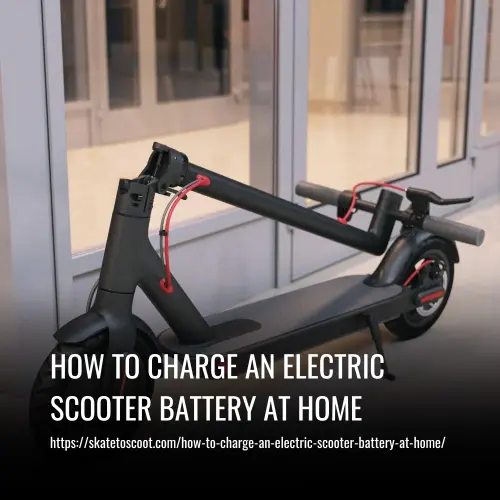How to Charge an Electric Scooter Battery at Home
As an Amazon Associate we earn from qualifying purchases.
Charging an electric scooter battery at home is a convenient and cost-effective way to keep your scooter ready for your daily commute or recreational rides. With the increasing popularity of electric scooters, it is important to understand the charging process to ensure optimal battery life and performance.
In this article, we will provide a step-by-step guide on how to properly charge your electric scooter battery at home, as well as valuable tips to extend battery life and prevent potential damage. By following these instructions, you can ensure that your scooter is always ready to hit the road with maximum power and efficiency.

How To Charge An Electric Scooter Battery At Home: A Step-by-Step Guide
Charging an electric scooter battery at home is a simple process that ensures your scooter is always ready for your daily commute or recreational rides. By following a few easy steps, you can properly charge your scooter’s battery and maximize its lifespan.
Step 1: Gather the necessary tools and accessories
To begin, gather the tools and accessories you will need for the charging process. This includes a compatible charger that meets your scooter’s battery specifications, a power outlet, and a clean, dry, and well-ventilated location. Ensure the charger has important safety certifications such as UL or CE.
Step 2: Power off your electric scooter
Before plugging in the charger, ensure that your electric scooter is turned off. This helps prevent any electrical hazards. Be sure to remove the key (if applicable) and put the scooter in a stable position.
Step 3: Locate the charging port
Find the charging port on your electric scooter. It is usually located near the battery or on the side of the scooter deck. Refer to your scooter’s user manual or look for a small, circular port with a protective cap.
Step 4: Plug in the charger
Start by plugging the charger into the power outlet. Make sure the outlet is clean and in good condition. Then, connect the charger to the scooter’s charging port. Some chargers have an indicator light that turns on when connected to the power source.
Step 5: Monitor the charging process
Charging times can vary depending on the scooter model and battery capacity. Typically, it takes anywhere from 4 to 12 hours to fully charge. Keep an eye on the charger’s indicator light, as it will change color or turn off when the battery is fully charged. Do not leave the battery charging unattended for long periods.
Step 6: Unplug and store the charger
Once your battery is fully charged, first unplug the charger from the power outlet and then disconnect it from the scooter’s charging port. Remember to store the charger in a safe and dry place when not in use.
By following these simple steps, you can easily charge your electric scooter battery at home. Remember to always use the correct charger and follow safety guidelines to ensure the best performance and longevity of your scooter’s battery.
Why Charge An Electric Scooter At Home
Charging an electric scooter at home offers convenience and cost-saving benefits. By utilizing the power from your home’s electrical outlet, you eliminate the need for a charging station or additional expenses. Simply plug your scooter into an outlet in your garage or house using a regular extension cord or plug.
You can conveniently charge your scooter overnight while you sleep, ensuring it is fully charged and ready for your daily commute. Home charging also allows you to have control over the charging process, ensuring the battery is properly maintained for optimal battery life.
It is important to use the original charger or a compatible charger specifically designed for your scooter to avoid battery damage. By charging your electric scooter at home, you can enjoy the convenience, save money, and ensure your scooter is always ready for your rides.
Are There Any Risks of Charging Electric Scooter Battery at Home
Charging an electric scooter battery at home is generally safe as long as you follow basic safety guidelines. It is important to use the correct charger provided by the manufacturer and ensure that you have a compatible wall outlet. Reputed manufacturers equip their battery systems with safety features to prevent mishaps.
However, it is advisable to choose an electric scooter from a reputable brand that complies with quality regulations for added safety. By following these precautions, the risks associated with charging the scooter battery at home can be minimized.
How Long Does It Take To Charge My Electric Scooter Battery
The charging time for an electric scooter battery can vary depending on the type of scooter and battery capacity. Most electric scooters, including one-wheel models, can be fully charged within 2 hours, with some models requiring even less than 1 hour. However, two-wheel electric scooters typically take about 5 hours for a full charge.
It’s important to note that there are three types of batteries commonly used in electric scooters: lead acid, lithium-ion, and lithium polymer. Lead acid batteries have the largest capacity and are the most common, while lithium-ion batteries have a smaller capacity and are more expensive.
The most advanced option is the lithium polymer battery, which offers high-temperature performance but comes at a higher cost. It’s recommended to use the original charger and avoid charging in extreme temperatures to avoid potential battery damage.
How Much Electricity Does An Electric Scooter Consume
When it comes to charging an electric scooter battery at home, you might have concerns about the amount of electricity it consumes. However, rest assured that charging your electric scooter does not significantly impact your electricity bill. In fact, the amount of electricity consumed by an electric scooter per charge is relatively small.
It is likely to be less than what you already pay for your regular monthly electricity bill. So, you can enjoy the convenience of your electric scooter without worrying about excessive energy consumption or skyrocketing electricity costs.
Safety Tips for Charging Electric Scooter Battery
Charging an electric scooter battery at home can be a convenient way to keep your scooter powered and ready for your daily commute. However, it’s important to follow some safety tips to ensure the longevity of your battery and avoid any potential risks.
1. Optimal Charging Voltage
It’s crucial to know the optimal charging voltage of your battery. Using the correct charger specifically designed for your scooter’s battery type is essential to prevent overcharging and potential damage to the battery.
2. Unplug after Charging
Once your battery is fully charged, make sure to unplug the charger from both the battery and the power outlet. Leaving the charger plugged in can lead to excessive heat buildup and may shorten the battery’s lifespan.
3. Charging Temperature
Avoid charging the battery in extreme temperatures. It is recommended to charge the battery between 0° Celsius and 45° Celsius for optimal performance and safety.
4. Battery Charge Level
It is best to operate your electric scooter when the battery charge level is between 30% to 80%. Avoid letting the battery discharge to 0% as it can strain the battery and negatively affect its lifespan.
5. Storage Considerations
If you won’t be using the scooter for an extended period, charge the battery up to 40%-50% before storing it in a cool and dry place. This keeps the battery in good condition and prevents complete discharge.
6. Wet Conditions
Never attempt to charge the battery when it is wet or submerged in water. This can cause electrical hazards and damage the battery and charger.
7. Removable Batteries
If your scooter has a removable battery pack, it’s advisable to store it indoors during monsoons or other wet conditions. Moisture can harm the battery and affect its performance.
By following these safety tips, you can ensure a longer battery life and a safer charging experience for your electric scooter.
FAQs
Yes, you can easily charge an electric scooter battery at home. Similar to charging your mobile phone, the process is simple and convenient. Start by plugging in the scooter’s original charger into a wall outlet or a dedicated charger. Ensure that the charger is compatible with your scooter’s battery type and voltage. The indicator light on the charger will typically turn green when the battery is fully charged.
Using the wrong type of e-scooter charger can potentially damage or decrease the lifespan of your electric scooter battery. It is important to always use the original charger or a compatible charger specifically designed for your scooter’s battery.
It is generally not recommended to leave your electric scooter charging overnight. Overcharging can lead to battery damage and reduce its overall lifespan. It is recommended to charge your scooter only for the required number of hours and then unplug it.
The charging time for electric scooter batteries can vary depending on the battery capacity and type. As a general rule of thumb, it is advisable to charge the battery for the amount of time mentioned in the manufacturer’s instructions, usually between 4 to 8 hours for a full charge.
The battery life of an electric scooter can vary depending on various factors, including the battery type, capacity, and usage patterns. On average, a fully charged battery can last between 10 to 30 miles or more, depending on the model and conditions.
To keep your electric scooter battery healthy, it is important to follow a few guidelines. Avoid overcharging or undercharging the battery, avoid exposing it to extreme temperatures, and charge only with the original or compatible charger. Additionally, it is recommended to avoid draining the battery completely before recharging it, as it can negatively impact its lifespan.
Conclusion
In conclusion, charging an electric scooter battery at home is a straightforward process that can help ensure your scooter is ready for your daily commute or leisure rides. It’s essential to use the correct charger specifically designed for your scooter battery type, whether it’s a lithium-ion or lead-acid battery.
When charging, make sure to use a dedicated charger and connect it to a power outlet without any flammable materials nearby. Keep an eye on the battery’s voltage and capacity levels, and avoid extreme temperatures that can negatively impact the battery life.
Most electric scooters come with an indicator light that changes color or displays a green light when fully charged. Remember to charge your battery regularly and avoid completely draining it to prolong its lifespan.
